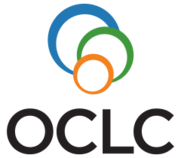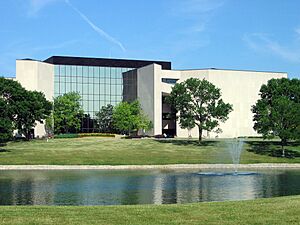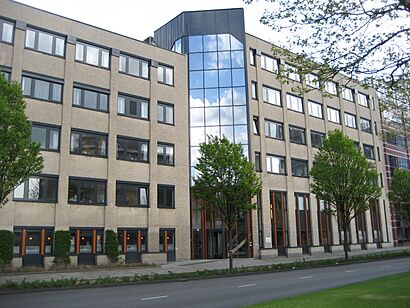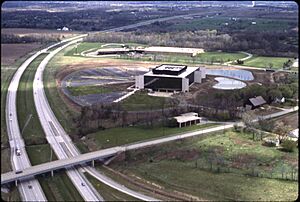OCLC facts for kids
 |
|

OCLC headquarters in 2007
|
|
| Founded | July 5, 1967 (as Ohio College Library Center) |
|---|---|
| Founder | Fred Kilgour |
| Type | 501(c)3 organization |
| Headquarters | Dublin, Ohio, U.S. |
|
Region
|
Worldwide |
| Products |
|
|
Members
|
30,000+ libraries in 100+ countries |
|
President & CEO
|
Skip Prichard |
|
Revenue (2020–21)
|
$217.8 million |
OCLC, Inc. is a special organization in America that helps libraries all over the world. It's like a big team where libraries work together! OCLC provides helpful computer services, does research, and creates programs for libraries and people who use them.
OCLC started in 1967 as the Ohio College Library Center. As it grew, its name changed to the Online Computer Library Center. In 2017, the name officially became OCLC, Inc.
OCLC and thousands of libraries work together to create and update WorldCat. This is the biggest online catalog of books and other items in the world! Libraries pay fees for the many services OCLC offers. These fees help fund OCLC's work. OCLC also helps manage the Dewey Decimal Classification system, which helps organize books in libraries.
Contents
How OCLC Started
OCLC began in 1967. It was created by university leaders and library directors in Ohio. They wanted to build a computer network for libraries in their state. This network would help libraries work together.
The group first met on July 5, 1967. They signed papers to officially start the nonprofit organization. They hired Frederick G. Kilgour to be their first leader. He used to be a librarian at Yale University.
The Idea Behind OCLC
Fred Kilgour and Ralph H. Parker had an idea in 1965. They wanted to combine computers with libraries. Computers were a new way to store information. Libraries were the oldest way. They wanted to link library catalogs electronically. This would help libraries save money and work better. It would also help researchers and students find information more easily.
The very first library to use OCLC's online cataloging was the Alden Library at Ohio University. This happened on August 26, 1971. It was the first time any library in the world did online cataloging!
Growing Beyond Ohio
From 1967 to 1977, only libraries in Ohio could join OCLC. But in 1978, new rules allowed libraries from other states to join. Because of this growth, the name changed to the Online Computer Library Center in 1977. In 2002, libraries from outside the United States could also join.
As OCLC grew, it worked with "networks." These were groups that helped libraries with training and support. By 2008, there were 15 such groups in the United States. These networks helped choose people to be on OCLC's main council. Later, the rules changed, and the networks were no longer directly tied to how OCLC was run.
In 2022, OCLC changed its membership rules again. Now, any organization that subscribes to many of OCLC's products can become a member. This change happened because OCLC had added many new services by buying other companies.
Leaders of OCLC
Here are the people who have led OCLC over the years:
- 1967–1980: Frederick G. Kilgour
- 1980–1989: Rowland C. W. Brown
- 1989–1998: K. Wayne Smith
- 1998–2013: Jay Jordan
- 2013–present: Skip Prichard
What OCLC Does
OCLC helps people find information like book summaries and full articles.
WorldCat: The Big Library Catalog
OCLC and its member libraries work together to create and update WorldCat. This is the largest online public catalog in the world! It has records from libraries everywhere.
Dewey Decimal System
OCLC also owns the Dewey Decimal Classification System. This system helps libraries organize their books by topic.
Other Services
For many years, OCLC printed catalog cards for libraries. These were physical cards that helped people find books. OCLC printed its last catalog cards on October 1, 2015.
QuestionPoint was a service that let people ask librarians questions online, 24 hours a day. It was sold to another company in 2019.
OCLC Software
OCLC sells different computer programs to libraries. Some of these are:
- CONTENTdm: For managing digital collections, like old photos or documents online.
- Wise: A system that helps libraries manage their books and connect with their community.
- WorldCat Discovery: This helps library users search for books, e-books, and other resources all in one place.
- WorldShare Management Services: A system for libraries to manage their electronic resources.
- cloudLibrary: A system that helps libraries lend out e-books, digital magazines, and streaming videos.
- Meridian: A tool that helps libraries manage information using "linked data." This helps connect different pieces of information across the internet.
Research at OCLC
OCLC has been doing research for libraries for over 30 years. They share what they learn through articles, reports, and presentations. You can find these on their website.
During the COVID-19 pandemic, OCLC helped with a project called REALM. This project studied how the virus might spread on library materials. They published reports to help libraries stay safe.
How OCLC Supports Libraries
OCLC works to support libraries and help them grow. They meet with library leaders, researchers, and political leaders. They want to help libraries with research, education, and sharing information around the world.
WebJunction is a part of OCLC that provides training for librarians. It has received money from the Bill & Melinda Gates Foundation to help with this.
In 2003, OCLC worked with big search engines like Google and Yahoo! This helped make WorldCat records searchable through those websites. This meant more people could find library resources.
OCLC also had a campaign called "Geek the Library." It started in 2009 and showed how important public libraries are.
OCLC has also worked with the Wikimedia Foundation, which runs Wikipedia. They have helped connect library information with Wikipedia projects. They even had a "Wikipedian in residence" to help with this.
WorldCat: The Global Library Catalog
WorldCat is OCLC's huge database. Both the public and librarians use it to find books and do research. You can search WorldCat online through a service called FirstSearch, which many libraries subscribe to. You can also search it for free on WorldCat.org.
OCLC Identifiers and Linked Data
OCLC gives a special number called an "OCN" (OCLC Control Number) to each new record in WorldCat. This is like how the Library of Congress gives an "LCCN" to its records. These numbers help link WorldCat's records to local library systems. They provide a common way to find a record across different libraries.
OCNs are very useful for books that don't have an ISBN (a standard book number), like older books. OCNs are often used as identifiers on Wikipedia and Wikidata. In 2013, OCLC made these numbers public so more people could use them.
OCLC also runs the Virtual International Authority File (VIAF). This helps organize names of authors and other people. VIAF numbers are used as standard identifiers, including on Wikipedia.
In 2024, OCLC launched a new tool called OCLC Meridian. This tool helps libraries manage "linked data." Linked data helps connect information from different sources on the internet. This makes it easier for people to discover and find what they are looking for in libraries.
Companies OCLC Has Acquired

OCLC has bought several other companies over the years to expand its services.
- In 2002, OCLC bought NetLibrary, which provided e-books. They later sold it in 2010.
- OCLC owns OCLC PICA, a company in the Netherlands that helps libraries with computer systems.
- In 2006, the Research Libraries Group (RLG) joined with OCLC.
- In 2008, OCLC bought EZproxy, a tool that helps people access library resources from home. They also acquired OAIster, which provides access to digital collections.
- In 2013, OCLC bought HKA, a Dutch company that made the "Wise" library system. OCLC now offers Wise to libraries in the United States.
- In 2015, OCLC acquired Sustainable Collection Services (SCS). This company helped libraries manage their print collections.
- In 2017, OCLC acquired Relais International, a company that helps libraries lend and borrow items from each other.
You can find a more complete list of companies OCLC has acquired on their website.
See also
 In Spanish: OCLC para niños
In Spanish: OCLC para niños
- Public library advocacy
 | Janet Taylor Pickett |
 | Synthia Saint James |
 | Howardena Pindell |
 | Faith Ringgold |


